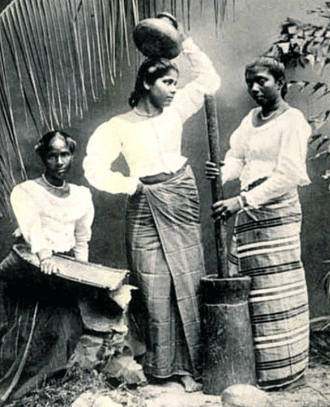Class 10 Civics Chapter 1 Question Answers - Democratic Politics - II
Q1: What do you mean by the word ethnic?
Ans: A social division based on shared culture. People belonging to the same ethnic group believe in their common descent because of similarities of physical type culture or both.
 Ethnic GroupQ2: Which ethnic group in Belgium has the largest population?
Ethnic GroupQ2: Which ethnic group in Belgium has the largest population?
Ans: Flemish.
Q3: ‘The tension between Dutch-speaking and French-speaking communities was more acute in Brussels’. Give reason.
Ans: The minority French-speaking community was relatively rich and powerful. So the Dutch-speaking community, who got the benefit of economic development and education much later showed resentment between the Dutch-speaking and the French-speaking communities.
Q4: Which are the most important social groups in Sri Lanka?
Ans: (i) Sinhala speaking (ii) Tamil speaking
Q5: Which ethnic group is in the majority in Sri Lanka?
Ans: Sinhala
 Sinhala Ethnic GroupQ6: Name the two subgroups of Tamils in Sri Lanka.
Sinhala Ethnic GroupQ6: Name the two subgroups of Tamils in Sri Lanka.
Ans: (i) Sri Lankan Tamils (ii) Indian Tamils
Q7: When did Sri Lanka emerge as an independent nation?
Ans: 1948
Q8: What is a Civil War?
Ans: It is a violent conflict between opposing groups within a country, for example, the conflict between Sinhalese and Indian Tamils in Sri Lanka.
Q9: Name the ethnic group of Sri Lanka which were involved in a Civil War.
Ans: (i) Sri Lankan Tamils or the Sinhalese (ii) Indian Tamils
Q10: What is majoritarianism? Name a country that has lost peace due to this.
Ans: A belief that the majority community should be able to rule a country in whichever way it wants, by disregarding the wishes and needs of the minority. Sri Lanka.
Q11: Power shared among different organs of government is known as the horizontal distribution of power. Give reason.
Ans: Because it allows different organs of government placed at the same level to exercise different powers.
 Power Sharing
Power Sharing
Q12: State one prudential reason and one moral reason for power sharing from the Indian content.
Ans: (i) India is a multicultural society.
(ii) India is a democratic country.
Q13: What is the difference between prudential and moral reasons for power sharing?
Ans: Prudential reasons stress that power-sharing will bring out better outcomes, whereas moral reasons emphasize the very act of power-sharing as valuable.
Q14: Apart from the Central and the State Governments, there is a third kind of government in Belgium. Which is that third kind of government?
Ans: Community government.
Q15: What is the basic principle of democracy?
Ans: The basic principle of democracy is that people are the source of all political power.
Q16: For a long time it was believed that all power of government must reside in one person or group of persons located in one place. Give reason.
Ans: It was felt that if the power to decide is dispersed, it would not be possible to make quick decisions.
Q17: What is a community government?
Ans: A community government is one in which different social groups are given the power to handle the affairs related to their communities. They are expected to work jointly for the benefit of the common masses without undermining any one community.
Q18: Name the most important organs of the government.
Ans: Legislature, Executive, and Judiciary
Q19: What is a federal government?
Ans: It is a government under which two or more than two sets of governments govern the country.
Q20: What is a reserved constituency?
Ans: A reserved constituency is a constituency that is reserved for a particular section of society.
|
66 videos|614 docs|79 tests
|
FAQs on Class 10 Civics Chapter 1 Question Answers - Democratic Politics - II
| 1. What is power sharing in a democratic setup? |  |
| 2. Why is power sharing important for a country? |  |
| 3. What are the different forms of power sharing? |  |
| 4. How does power sharing enhance democracy? |  |
| 5. Can you give an example of power sharing in practice? |  |

















